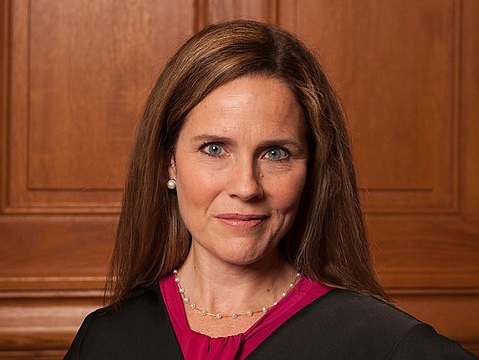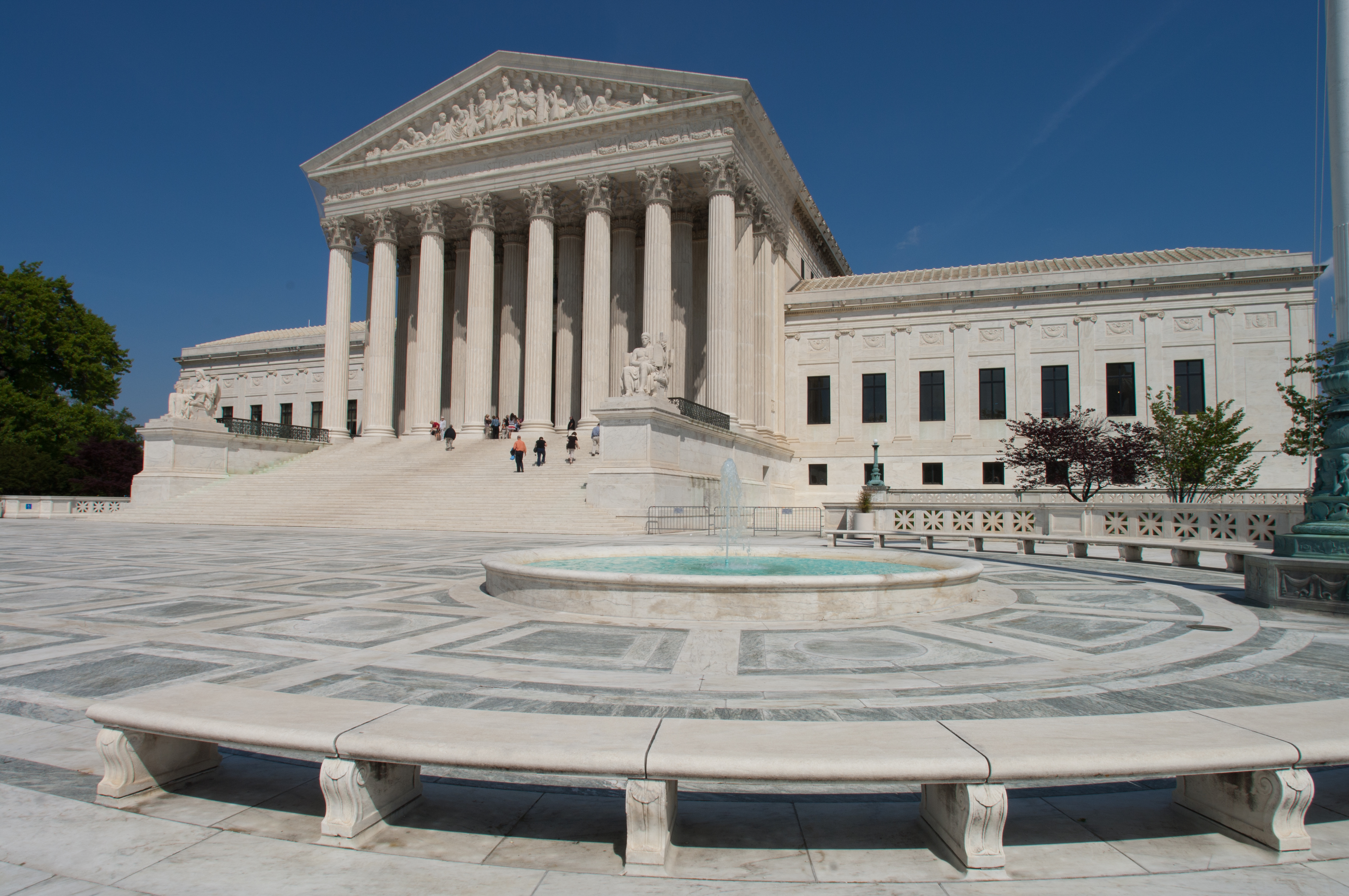Hon. Amy Coney Barrett
United States Court of Appeals for the Seventh Circuit (2017-Present)
As news reports indicate, Judge Amy Coney Barrett of the Seventh Circuit is on the short list to be nominated to the U.S. Supreme Court to fill the vacancy created by the passing of Justice Ruth Bader Ginsburg. Barrett has been in this position before. When we originally examined her record in July 2018, prior to the nomination of Brett Kavanaugh to the Supreme Court, there was little to say. At that time, Barrett had been a judge for less than a year, and unsurprisingly, she had ruled on a relatively small number of appeals. None of those cases touched on the core questions of political speech and association that the Institute evaluates when reviewing potential Supreme Court justices.
In 2018, we also conducted a review of Judge Barrett’s extensive academic record. Those articles, which were the subject of controversy during her confirmation as a federal appeals court judge, did not directly address issues of free political speech and association.
Since that time, Judge Barrett has written or joined an opinion in at least three free speech-related cases worthy of commentary. We continue to review other cases in which Judge Barrett participated and may release further analyses. [UPDATE: See this post for another case where Judge Barrett joined an opinion interpreting the First Amendment.]
-
- Adams v. Bd. of Educ. of Harvey Sch. Dist. 152, 968 F.3d 713 (7th Cir. 2020) (Easterbrook, J.) (3–0 decision)
- Lett v. City of Chicago, 946 F.3d 398 (7th Cir. 2020) (3-0 decision)
- Smadi v. True, 783 F. App’x 633 (7th Cir. 2019) (per curiam)
Barrett authored the opinion in only one of those cases. Reading them together, however, Judge Barrett may be willing to expand free speech protections in limited but nevertheless important contexts.
Adams and Lett both involved municipal employees’ free speech rights under the Due Process Clause of the Fourteenth Amendment. The former reaffirmed the principle that public employees do not automatically lose their rights when employed by a municipality – especially whistleblowers. The latter, however, which Judge Barrett authored, reaffirmed the principle that, in some instances, government employees lose all speech protections – even whistleblowers.
Smadi involved a pro se federal prisoner’s speech rights under the First Amendment. Although the court did not conclusively rule on the scope of protection that the First Amendment provided, the court gave the plaintiff an additional opportunity to articulate his case with the assistance of counsel, signaling that the law governing free speech claims against federal officials is not yet settled, and that it is better to err on the side of protecting civil liberties until the law is settled.
Adams v. Bd. of Educ. of Harvey Sch. Dist. 152
When plaintiff school superintendent Denean Adams requested approval of a forensic audit of the district’s finances, she met swift and stiff resistance. One school board member called her district-issued cell phone and warned that “she was ‘itching for an ass-kicking.’” Adams reported the threat to the police. Another school board member – the wife of the individual who delivered the threat – later confronted Adams in her office about her performance. Then, when Adams subsequently suspended the district’s business manager for “financial irregularities,” the board declined to renew her contract. The board did not fire her outright, but it “began to bypass her whenever possible.” Adams endured so much stress that she took medical leave and never returned to work.
At trial, Adams prevailed on her First Amendment retaliation claim. A unanimous panel of the Seventh Circuit agreed, finding that Adams’s speech fell on the right side of the balancing test that emerged from the Supreme Court’s holdings in Pickering v. Bd. of Educ., 391 U.S. 563 (1968), and Connick v. Myers, 461 U.S. 138 (1983), two watershed cases in a trio that govern speech by public employees. Under the Pickering–Myers balancing test, a public employee who speaks as a private citizen on matters of public concern receives all of the protection that any other ordinary citizen would receive under the First Amendment’s Free Speech Clause, if the government’s interest in the efficient delivery of public services does not outweigh the speaker’s private interest in expression. On that point, the Seventh Circuit reasoned as follows:
Suppose we look at the police report in isolation. This was not a straightforward report of crime – for example, notice of a burglary or robbery. It was a report by the superintendent of a school district that she had been threatened with violence by a member of the school board. The members are elected officials, whose constituents could be influenced by news that one of their representatives proposed to substitute violence for the normal process of voting. And a potential for physical altercations between public officials . . . implies that an important public institution was not working properly. This is a legitimate subject of public concern.
More: it would be a mistake to look at the police report in isolation. The problem began when Adams proposed a forensic audit, as Adams told the police. The very idea of such an audit seems to have unsettled at least one member of the Board, who wanted the audit’s proponent gone (or the proposal withdrawn) before anyone could delve deeply into the school district’s finances. This led to a dispute about the superintendent’s tenure and to what a reasonable observer could understand as the superintendent’s constructive discharge before her contractual term ended. All of these are subjects of public interest. When the superintendent suspended the business manager, the gap between superintendent and Board became unbridgeable. Parents and others who vote for members of school boards need to know how their institutions are working. The police report, and the controversy within the Board more generally, readily could have affected the outcome of elections as well as the daily management of the school system.
Against that backdrop, the court ruled that Adams’s report to the police, at a minimum, was protected speech, that a reasonable jury could find that the school board impermissibly retaliated against her on the basis of her speech, and that the jury’s verdict should not be overturned. In so doing, the court, including Judge Barrett, reaffirmed the important principle that people do not automatically surrender their fundamental rights simply by choosing to work for a municipal government, especially when they blow the whistle about certain matters of public importance.
In contrast, Kelvin Lett worked as an investigator, reviewing allegations of police misconduct for the City of Chicago. After he drafted a report on a police shooting, Lett’s supervisor ordered him to write in the report that officers had planted a gun on the victim. Lett refused because he did not believe that the evidence in the investigative file justified the statement. He was disciplined for his refusal.
Just as Denean Adams had done, Kelvin Lett filed a civil rights lawsuit alleging that his supervisors and his agency had retaliated against him for speaking out about matters of public concern. But this time, the trial court dismissed the case out of hand. On appeal, Judge Barrett, writing for a unanimous panel, affirmed the dismissal.
Judge Barrett’s ruling turned on the notion that Kelvin Lett’s speech did not satisfy the prongs of the Pickering–Myers test and instead fell within the sweep of the Supreme Court’s ruling in Garcetti v. Ceballos, 547 U.S. 410 (2006), the third case in the trio that governs public employees’ speech. Under Garcetti, a municipal employer can fire or discipline an employee on the basis of the employee’s speech, if the speech at issue “owes its existence to a public employee’s professional responsibilities.” To that end, Garcetti can be read as a logical extension of Pickering–Myers in the sense that, if someone is not speaking as a private citizen, they do not enjoy the same First Amendment protections that any other citizen enjoys under the Free Speech Clause.
But in other ways, Garcetti has had drastic consequences for whistleblowers at all levels of government. Unlike the Pickering–Myers test, Garcetti gives no weight to a speaker’s interest in expression or the possibly significant importance that the speech could have to the public. Rather, when a court applies Garcetti, it asks only one question: Was the plaintiff’s speech uttered as a function of their government job? If the answer is “no,” then the case proceeds under Pickering–Myers. But if the answer is “yes,” then the plaintiff has no free speech protection at all.
Over three decades after Myers, in Lane v. Franks, 573 U.S. 228 (2014), the Supreme Court offered a glimmer of hope to whistleblowers after Garcetti. Justice Sonia Sotomayor, writing for a 9-0 majority, ruled that “truthful sworn testimony, compelled by subpoena, outside the scope of [a public employee’s] ordinary job responsibilities” does receive First Amendment protection. Lane is thus a logical extension of Garcetti; one can speak about their government job without speaking in the discharge of their job duties. The former is protected by the First Amendment, but the latter remains unprotected.
In examining Kelvin Lett’s case, Judge Barrett straightforwardly applied Garcetti to his retaliation claim:
Lett . . . alleges retaliation for . . . refusing to alter an investigative report that he was assigned to prepare. . . . Lett would have had neither occasion nor reason to refuse the request if not for his job. In the language of Garcetti, Lett’s refusal to amend the report was “speech that owe[d] its existence” to his professional responsibilities.
Kelvin Lett argued that the panel should have expanded Lane beyond truthful, sworn testimony about one’s job to include his report, based on the likelihood that his report would become evidence in litigation down the road. But Judge Barrett declined the invitation, arguably with good reason, reasoning that Lett’s supervisor did not ask him to lie per se, but instead asked Lett to make factual findings in the report with which Lett personally disagreed.
The results in Adams and Lett seem to be at odds with each other on their merits, but they were correctly decided under prevailing First Amendment law. At most, they tell us that Judge Barrett will faithfully apply well-established precedent correctly to cases that come before her. Circuit judges are bound to do just that, leaving one to wonder how she would approach a case where the law is not so settled.
Hosam Smadi is a Jordanian citizen who was serving time in a federal prison in Illinois when he attempted to send letters to an attorney, seeking representation; the Jordanian ambassador to the United States, seeking diplomatic intervention in his case; and the press, seeking publicity of his case. The Federal Bureau of Prisons allegedly blocked Smadi’s outgoing communications and prevented him from using the inmate computer system to transmit information electronically. So Smadi, without the assistance of a lawyer, filed a federal civil rights lawsuit alleging infringement of his First Amendment rights.
Smadi brought his lawsuit under Bivens v. Six Unknown Named Agents of Fed. Bureau of Narcotics, 403 U.S. 388 (1971), a case in which the Supreme Court ruled that the Fourth Amendment contains an implied right to sue for compensatory damages for a violation thereof, so long as Congress had not expressly foreclosed that remedy in statute and “no special factors counsel[] hesitation” against awarding damages. For over 40 years, Bivens was the vehicle under which plaintiffs would pursue constitutional cases against federal government officials in the same way they pursued cases against state government officials under 42 U.S.C. § 1983.
Three years ago, however, the Supreme Court stated in Ziglar v. Abbasi, 137 S.Ct. 1843 (2017), that expanding the reach of Bivens beyond unconstitutional searches and seizures is “a ‘disfavored’ judicial activity.” Notwithstanding this reluctance, however, the Supreme Court has never expressly foreclosed the possibility of recovery for First Amendment violations under Bivens, despite having at least three relatively recent opportunities to do so in Wood v. Moss, 134 S.Ct. 2056 (2014), Reichle v. Howards, 132 S.Ct. 2088 (2012), and Ashcroft v. Iqbal, 556 U.S. 662 (2009). This uncertainty about the scope of Bivens, however mild, may have created a soft spot for free speech advocates to pursue First Amendment claims against federal government officials.
With this framework in mind, the trial court dismissed Smadi’s First Amendment claims as a matter of law under Abbasi before any discovery took place. The unanimous panel of the Seventh Circuit reversed in a per curiam opinion, concluding that:
[W]e cannot fully evaluate [Smadi’s First Amendment claims] on the current record. In deciding what, if any relief, a plaintiff may obtain from federal officers for alleged constitutional violations post-Abbasi, courts of appeals have foreclosed a Bivens-style damages remedy, but often after receiving counseled briefing on the matter.
We think that the best approach is for the district court to recruit counsel for Smadi and receive adversarial briefs on the First Amendment claims. Counsel can consider which claims for damages, if any, counsel believes Smadi may still pursue after Abbasi, and then focus on whether, and under what authority, an alternative remedy such as injunctive relief may be available.
With that, the Seventh Circuit vacated the trial court’s dismissal of Smadi’s First Amendment claims and remanded the case for further proceedings.
Because Smadi was a per curiam opinion, it is difficult to tell whether or how important the free speech principles at issue were to Judge Barrett personally in reaching her decision to join the unanimous panel. Moreover, as with Lett, Judge Barrett may have just been following Seventh Circuit precedent in granting Smadi another chance to fully articulate his First Amendment claims with the aid of counsel. But given the lingering uncertainty about the scope of Bivens after Abbasi, the decision in Smadi may portend a willingness on Judge Barrett’s part to expand Bivens to include implied claims for damages under the First Amendment’s Free Speech Clause.
Justice Clarence Thomas and the late Justice Antonin Scalia – Judge Barrett’s boss during her Supreme Court clerkship – both took positions against expanding Bivens in Wilkie v. Robbins, 551 U.S. 537 (2007), and Corr. Servs. Corp. v. Malesko, 534 U.S. 61 (2001). It is not clear whether or to what extent their views may (or do) influence Judge Barrett’s, but her willingness to join a unanimous panel that gave Smadi every opportunity to fully ventilate his free speech concerns with the aid of counsel, even after Abbasi, suggests that she may think differently about Bivens than her former boss and his closest originalist ally on the Court.














